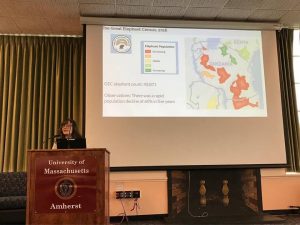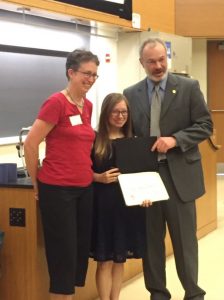 Paige co-authored one of 16 articles in a special issue on urban evolution in the Proceedings of the Royal Society: http://royalsocietypublishing.org/cc/the-evolution-of-city-life
Paige co-authored one of 16 articles in a special issue on urban evolution in the Proceedings of the Royal Society: http://royalsocietypublishing.org/cc/the-evolution-of-city-life
The editors produced a nice blog post about the special issue: http://blogs.royalsociety.org/publishing/the-evolution-of-city-life/
Collectively, the editors say, “papers in this Special Feature highlight the power of cities as a globally replicated experiment that provides an unparalleled opportunity to understand how human-altered environments, and particularly cities, affect the evolution of life around us. In this context there are three take-aways from the 15 papers published in this Special Feature. First, studies on ants, plants, birds, and bees have all shown that cities frequently alter natural selection. Second, this altered selection frequently leads urban populations to be better adapted to cities than their nonurban counterparts, an effect which is often consistent across different cities. Third, the development of cities has given rise to new human commensal species, as in the case of house sparrows, which have evolved to thrive on starch-rich diets commonly found in human-dominated landscapes.“
Our contribution shows that species interactions like pollination can play a role in mediating effects of natural selection on plant traits. However, these effects are sometimes rather modest, and the strength of their effect on natural selection can vary from year to year.




 Jodie‘s research on male elephant social behavior in different parks and reserves in Tanzania is part of an ongoing project with the School for Field Studies, and she collected her data under the advisement of Dr. John Kioko. Jodie joined the Warren Lab as a field crew technician during the summer of 2017 to help with graduate student Kit Straley’s dissertation on the Wood Thrush, and she analyzed nest camera footage for parental behaviors during her last semester at UMass. Her passion for animal behavior and conservation is inspiring, and she shared that passion by presenting her elephant work at an undergraduate research conference this past month. Way to go, Jodie!
Jodie‘s research on male elephant social behavior in different parks and reserves in Tanzania is part of an ongoing project with the School for Field Studies, and she collected her data under the advisement of Dr. John Kioko. Jodie joined the Warren Lab as a field crew technician during the summer of 2017 to help with graduate student Kit Straley’s dissertation on the Wood Thrush, and she analyzed nest camera footage for parental behaviors during her last semester at UMass. Her passion for animal behavior and conservation is inspiring, and she shared that passion by presenting her elephant work at an undergraduate research conference this past month. Way to go, Jodie! Christina‘s research focuses on the effects of urbanization on ectoparasite loads, anthropogenic nest materials, and nestling health in the House Wren. She joined the lab during the summer of 2017 as a field crew technician to help with graduate student Aaron Grade’s dissertation on the House Wren. She stayed on in the lab during the semester to begin dissecting the very nests she so carefully monitored during the summer. Conclusion: wrens are dirty messy birds. She persevered through thousands of mites, and helped the lab develop an assessment tool for mite loads which we will continue to use in the future. Today Christina did an excellent job presenting her findings to her program. Way to go, Christina!
Christina‘s research focuses on the effects of urbanization on ectoparasite loads, anthropogenic nest materials, and nestling health in the House Wren. She joined the lab during the summer of 2017 as a field crew technician to help with graduate student Aaron Grade’s dissertation on the House Wren. She stayed on in the lab during the semester to begin dissecting the very nests she so carefully monitored during the summer. Conclusion: wrens are dirty messy birds. She persevered through thousands of mites, and helped the lab develop an assessment tool for mite loads which we will continue to use in the future. Today Christina did an excellent job presenting her findings to her program. Way to go, Christina!